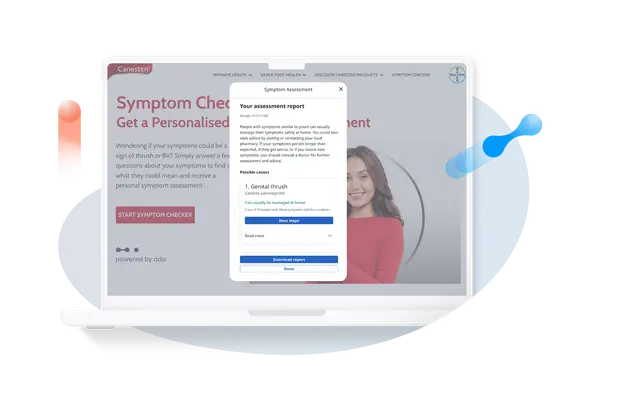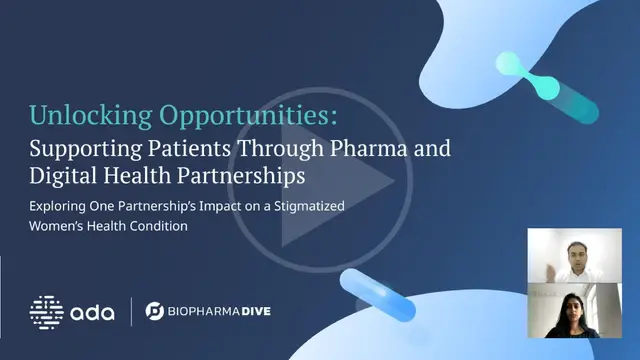Bayer partnered with Ada Health to create a digital tool for self-assessment, symptom checking and health insights that serves as a safe space for women to get answers about intimate health issues.
Although 93% of women made appointments with their healthcare providers during a one-year period 1 , fewer than three-quarters scheduled general checkups or well-woman visits. The number of women skipping out on essential healthcare is significant, especially given that one in three women experience reproductive or gynecological health issues 2 . As a result, women’s intimate health issues often go undiagnosed. 3

"Digital health is playing an increasingly important role moving forward and is evolving," says Rohan Kamath, Head of Global Strategic Commercial Intelligence at Bayer Consumer Health. "We see healthcare brands and healthcare businesses trying to meet this increased demand for information and education through their brands, through their platforms to bring more credible information, products, and solutions."
users have completed an assessment
more time consumers spent on Bayer websites
increase in Bayer webpages viewed
Vaginal infections are also common with an estimated 70% of women diagnosed with vulvovaginal candidiasis once during reproductive age—and more than 40% experience recurrent infections,
5
making yeast infections the second most common cause of genital infection among women,
6
which, if left untreated can lead to an increased risk of health issues.
7
Many women may feel uncomfortable seeking medical treatment for intimate health issues—but also need support to understand the cause of their symptoms. Research found that just over 26% of women who thought they had yeast infections made the correct self-diagnosis.
8


Embarking on a personalized health revolution for women’s intimate health issues was the next step in the journey to provide a holistic one-stop solution for intimate health conditions. The AI-powered health assessment platform asks targeted questions and generates data-driven care options and recommendations for the next steps in seeking care, including opportunities to educate women about the condition, view available Canesten products with online and brick-and-mortar locations, and purchase treatments.

Head of Global Strategic Commercial Intelligence at Bayer Consumer Health

Brand Lead for Canesten, Bayer Consumer Health
clicked on "What can I do next?"
of uncertain patients are guided to a care choice
higher engagement with promotional coupons.
more time spent on Bayer websites
more Bayer web pages viewed by consumers.

Head of Global Strategic Commercial Intelligence at Bayer Consumer Health
Kamath believes that partnering with Ada, with healthcare-specific tools backed by science that can be deployed on a global scale, is key as the connection between life sciences and digital health becomes an essential component of holistic healthcare.
"[Pharma and digital health] have to and will coexist. The role of digital health is becoming increasingly important post-COVID [and] consumers are a lot more comfortable doing a lot of that journey of self-care and knowledge themselves as a first step before going to a doctor," he says. "Digital health has become a new baseline, and I expect to continue."


You can read more about the partnership and watch the webinar with Rohan here
Disclaimer: Ada Assess is not a substitute for advice from a healthcare professional and does not provide a final medical diagnosis.
Kaiser Family Foundation. "Women's Health Care Utilization and Costs Findings from the 2020 KFF Women's Health Survey." https://www.kff.org/womens-health-policy/issue-brief/womens-health-care-utilization-and-costs-findings-from-the-2020-kff-womens-health-survey/. April 21, 2021.
Public Health England. "Survey reveals women experience severe reproductive health issues." https://www.gov.uk/government/news/survey-reveals-women-experience-severe-reproductive-health-issues . June 26, 2018.
World Economic Forum. "5 conditions that highlight the women's health gap." https://www.weforum.org/agenda/2024/05/womens-health-gap-healthcare/. May 3, 2024.
Kaiser Family Foundation. "Women's Experiences with Provider Communication and Interactions in Health Care Settings: Findings from the 2022 KFF Women’s Health Survey." https://www.kff.org/womens-health-policy/issue-brief/womens-experiences-with-provider-communication-interactions-health-care-settings-findings-from-2022-kff-womens-health-survey/. February 22, 2023.
National Library of Medicine. "Vaginal Candidiasis." https://www.ncbi.nlm.nih.gov/books/nbk459317/. February 3, 2024.
Erfaninejad, M., Salahshouri, A. Amirrajab, N. "Barriers and facilitators of adherence to treatment among women with vulvovaginal candidiasis: A qualitative study." European Journal of Medical Research. https://www.ncbi.nlm.nih.gov/pmc/articles/pmc9767851/. December 21, 2022.
U.S. Department of Veterans Affairs. "Bacterial Vaginosis—Women's Health Guide." https://www.publichealth.va.gov/infectiondontpassiton/womens-health-guide/bacterial-vaginosis.asp.
Hoffstetter, S.E., Barr, S. LeFevre, C. et al. "Self-reported yeast symptoms compared with clinical wet mount analysis and vaginal yeast culture in a specialty clinic setting." Journal of Reproductive Medicine. https://pubmed.ncbi.nlm.nih.gov/18664056/. June 2008.
McKinsey & Company. "Unlocking opportunities in women's healthcare." https://www.mckinsey.com/industries/healthcare/our-insights/unlocking-opportunities-in-womens-healthcare. February 14, 2022.
World Health Organization. "The role of artificial intelligence in sexual health and reproductive health and rights." https://iris.who.int/bitstream/handle/10665/376294/9789240090705-eng.pdf?sequence=1. March 21, 2024.
World Health Organization. "Digital tools can help improve women's health and promote gender equity, WHO report shows." https://www.who.int/europe/news/item/08-03-2024-digital-tools-can-help-improve-women-s-health-and-promote-gender-equality--who-report-shows. March, 8, 2024.